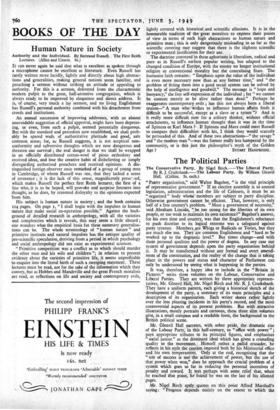BOOKS OF THE DAY
Human Nature in Society
Authority and the Individual. By Bertrand Russell The First Reith Lectures. (Allen and Unwin. 6s.)
IT can never again be said that what is excellent as spoken through a microphone cannot be excellent as literature. Even Russell has rarely written more lucidly, lightly and directly about high abstrac- tions and generalities, making general notions seem familiar, and preaching a sermon without striking an attitude or appealing to authority. For this is a sermon, delivered from the characteristic modem pulpit to the great, half-attentive congregation, which is always ready to be improved by eloquence and direct address. It is, of course, very much a lay sermon and no living Englishman has Russell's personal authority combined with his detachment from creeds and institutions.
An annual succession of improving addresses, with an almost unavoidable suggestion of official approval, might have been depress- ing, or even, from such a pulpit, seemed potentially dangerous. But with the standard and precedent now established, we shall prob- ably be spared wads of authoritative platitude and good, safe common sense; for as Russell suggests it is not sceptical non- conformity and subversive thoughts which are now dangerous and threaten our survival ; the real danger is that we shall be wrapped in an officially distributed cotton-wool of pious orthodoxy and received ideas, and lose the creative habit of disbelieving or simply disregarding authorised preachers and received opinions. A dis- tinguished foreign observer once remarked of a group of young men in Cambridge, of whom Russell was one, that they lacked a sense of reverence ; it is the lack of this sense, magnificently preserved, which makes Russell the perfect first Reith lecturer, the first of a line who, it is to be hoped, will provoke and surprise listeners into thought, as he does, by reasoned disloyalty to the opinions expected 'from him.
His subject is human nature in society ; and the book contains 114 pages. On page r, "I shall begin with the impulses in human nature that make social co-operation possible." Against the back- ground of detailed research in anthropology, with all the varieties and complexities which it reveals, this may seem a little absurd ; one wonders what the empirical basis for these summary generalisa- tions can be. The whole terminology of "human nature" and primitive instincts and natural impulses has the antique quality of pre-scientific speculation, deriving from a period in which psychology and social anthropology did not exist as experimental sciences.
"Primitive competition was a conflict as to which should murder the other man and his wife and children "- in relation to present evidence about the varieties of primitive lie, it seems unprofitable to enquire into the literal birth of such a sweeping statement. These lectures must be read, not for the sake of the information which they convey, but as Hobbes and Mandeville and the great French moralists are read, as reflections on life and society and contemporary evils, lightly covered with historical and scientific allusions. It is in the honourable tradition of the great moralists to express their points of view in terms of such high abstractions as human nature and primitive man ; this is only dangerously misleading in so far as the scientific covering may suggest that there is the slightest scientific or experimental justification for their use.
The doctrine conveyed in these aphorisms is liberalism, radical and pure as in Russell's earliest popular writing, but adapted to the changed condition of Europe, with the enemy no longer institutional religion or conventional morality but the centralising State. The humanist faith remains : "Emphasis upon the value of the individual is even more necessary now than at any former time," and "the problem of fitting them into a good social system can be solved by the help of intelligence and goodwill." The message is "hope and buoyancy," the free self-expression of the individual ; for "we cannot be content merely to be alive rather than dead." Perhaps he exaggerates contemporary evils ; has this not always been a liberal truism—" A man who wishes to influence human affairs finds it difficult to be successful, except as a slave or a tyrant "? And is it really more difficult now for a solitary thinker, without official attachments, to influence human thought than it was in the time of Spinoza or Karl Marx ? If Spinoza and Marx could meet Russell to compare their difficulties with his, I think they would scarcely he persuaded of this. And of these two abstractions—" the savage" and "the modern man "—was the former really less hampered by the community, or is this just the philosopher's myth of the Golden


































 Previous page
Previous page